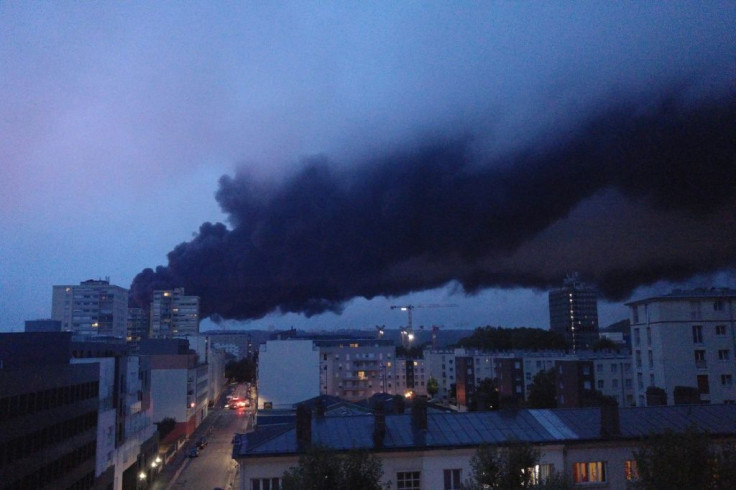Chemical Plant Fire In Northern France Threatens Seine

Acrid black smoke billowed over the northern French city of Rouen on Thursday after a spectacular fire broke out at a chemical factory, forcing authorities to close schools and warn of potential pollution risks for the nearby Seine river.
After hours of battling the blaze, around 200 firefighters had brought it under control by Thursday afternoon, though officials said it could be several days at least before it is fully extinguished.
"The fight they will have to wage to get the situation fully under control will take several days, maybe even weeks," Interior Minister Christophe Castaner said after arriving at the site.
The fire erupted at around 2:30 am (0030 GMT) at a storage facility owned by Lubrizol, a manufacturer of industrial lubricants and fuel additives which is owned by the billionaire American investor Warren Buffett.
It sits just a few kilometres from the centre of the city of around 100,000 people.
Castaner said firefighters had managed to remove "the most dangerous products" that could have provoked other explosions at other nearby industrial sites.
But the smoke had spread 22 kilometres (14 miles) and contains "a certain number of compounds which can be a health hazard," Castaner said, though there was no "particular danger" according to initial analyses.
"There was soot all over the streets, pavements and cars," said Jean-Claude Bleuzen, a deputy mayor of Preaux, a town some 15 kilometres northeast of Rouen.
Schools and creches nearby have been shut until Monday, though residents living nearby who were evacuated will be able to start returning to their homes Thursday evening, Pierre-Andre Durand, the top regional official, told journalists.
But he said "we're still advising people with health problems to stay in their homes until Friday evening."
Several people were wearing face masks while getting around the city.
Prosecutors have opened an inquiry into the cause of the explosion and fire, which woke up residents with a booming explosion.
Environmental threat
"The smoke is really striking and wherever you are in Rouen you can see it," Marina Andre, a 25-year-old who works in a bar near the factory, told AFP.
"You can smell fuel, not really a burned smell, it's very distinctive," she said, adding that people were still going to work and even cycling near the site of the blaze on the bank of the Seine river.
Lubrizoil said that the fire damaged a storage facility, a drumming warehouse and an administrative building, and that the cause was still unknown.
It advised residents not to eat fruit or vegetables from gardens without washing it thoroughly, and not to touch the soot or other particles on the ground.
Durand said that there was a risk that fuel or waste water from the site could overflow retainment ponds and reach the Seine, and that floating anti-pollution booms had been placed on the river.
"There is no pollution downstream," he said, and while some could escape as the tide came in, "it will be easy to recover because it's on the surface.
The Seine, one of France's biggest rivers, flows through Paris to the south and empties into the English Channel further north in Le Havre, which is home to a major fishing fleet.
In January 2013, the Lubrizol factory was responsible for a giant leak of the gas mercaptan, which smells like cabbage or rotten eggs and is often added to natural gas to alert people in case of leaks.
A cloud of the gas blew all the way to Paris and across the Channel into southern England, where residents complained about the odour.
And in 2015, 2,000 litres of mineral oil, which is used in lubricants, leaked from the Lubrizol site into the local sewer system in Rouen, which is famed for its cathedral.
© Copyright AFP 2024. All rights reserved.





















